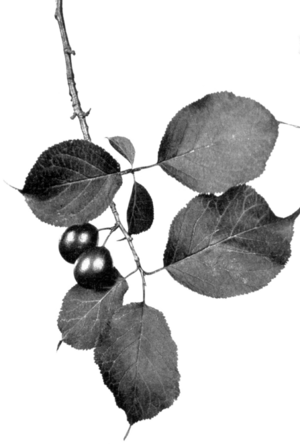Prunus sect. Prunocerasus facts for kids
Quick facts for kids Prunus sect. Prunocerasus |
|
|---|---|
 |
|
| Prunus nigra | |
| Scientific classification |
|
| Kingdom: | Plantae |
| Clade: | Tracheophytes |
| Clade: | Angiosperms |
| Clade: | Eudicots |
| Clade: | Rosids |
| Order: | Rosales |
| Family: | Rosaceae |
| Genus: | Prunus |
| Subgenus: | Prunus subg. Prunus |
| Section: | Prunus sect. Prunocerasus Koehne |
| Species | |
|
See text |
|
Have you ever eaten a delicious plum? Plums are juicy fruits that grow on trees. The scientific name for a group of these trees is Prunus sect. Prunocerasus. This fancy name means "plum-cherry," and it refers to a special group of plum trees mostly found in North America.
These plums are part of a larger family called Prunus. This family includes many other tasty fruits like cherries, peaches, apricots, and almonds!
Contents
What Are North American Plums?
The Prunocerasus section is like a special club for certain plum trees that grow naturally in North America. These trees are known for their yummy fruits and their ability to grow in different places.
A long time ago, a scientist named Bernhard Adalbert Emil Koehne first described this group. He thought they were part of the "cherry" group (called Cerasus). But now, scientists agree that these plums belong to the main "plum" group, which is called Prunus subg. Prunus. It's all about how scientists organize plants to understand them better!
Types of Plums in This Group
There are many different kinds of plums in the Prunocerasus section. Each one has its own special features, but they all share common traits as North American plums. Here are some of them:
- P. alleghaniensis (Allegheny Plum)
- P. americana (American Plum)
- P. angustifolia (Chickasaw Plum)
- P. geniculata (Scrub Plum)
- P. gracilis (Oklahoma Plum)
- P. hortulana (Hortulan Plum)
- P. maritima (Beach Plum)
- P. mexicana (Mexican Plum)
- P. munsoniana (Wildgoose Plum)
- P. murrayana (Murray's Plum)
- P. nigra (Canada Plum)
- P. × orthosepala (a natural hybrid plum)
- P. × palmeri (another natural hybrid plum)
- P. rivularis (Creek Plum)
- P. × slavinii (a natural hybrid plum)
- P. subcordata (Klamath Plum)
- P. texana (Texas Plum)
- P. umbellata (Flatwoods Plum)
Where Do These Plums Grow?
These plums are native to North America. This means they naturally grow in places like the United States, Canada, and Mexico. You can find them in many different environments, from forests to open fields and even along coastlines, depending on the specific type of plum.
They are often found in areas with plenty of sunlight and well-drained soil. Many of these plums are quite tough and can grow in places where other fruit trees might struggle.
Uses of North American Plums
North American plums are important for many reasons. They provide food for both people and wildlife.
Food for Wildlife
Many animals love to eat these plums. Birds, deer, bears, and other creatures enjoy the sweet, juicy fruits. The trees also provide shelter and nesting spots for birds and small animals. This makes them a key part of their local ecosystems.
Food for People
While some of these plums are quite tart, many are delicious when eaten fresh. People also use them to make jams, jellies, pies, and sauces. Some types are even grown in gardens and orchards because they are so tasty and easy to grow.
Native American tribes have used these plums for centuries as an important food source. They would eat them fresh or dry them for later use.
Growing Your Own Plums
If you're interested in gardening, some of these North American plums are great choices for planting. They are often more resistant to diseases and pests than other types of plums. They can also handle different weather conditions well.
Growing your own plum tree can be a fun way to enjoy fresh fruit and help local wildlife!
 | Toni Morrison |
 | Barack Obama |
 | Martin Luther King Jr. |
 | Ralph Bunche |

